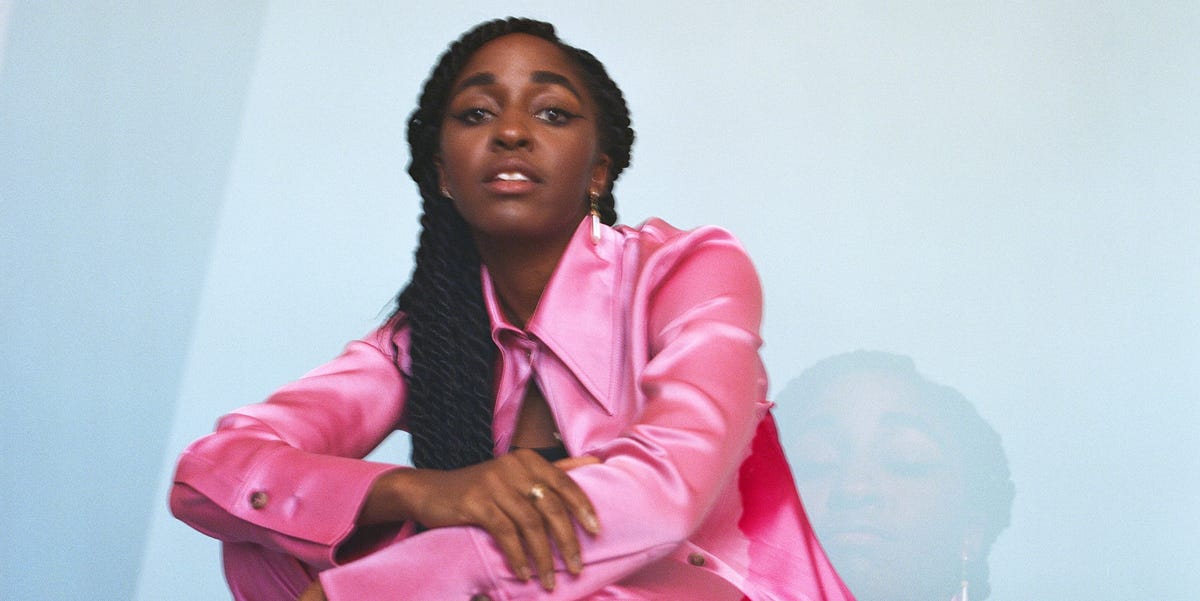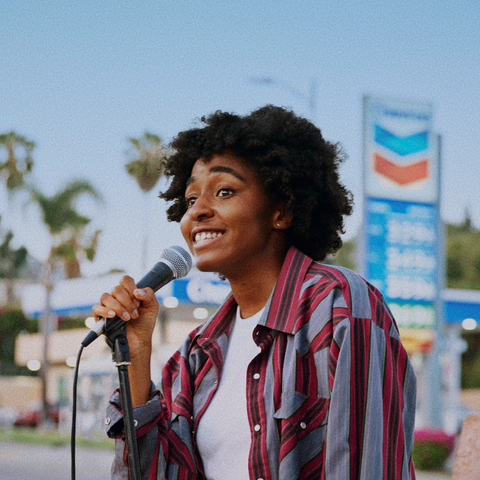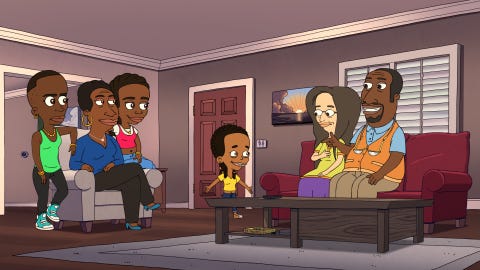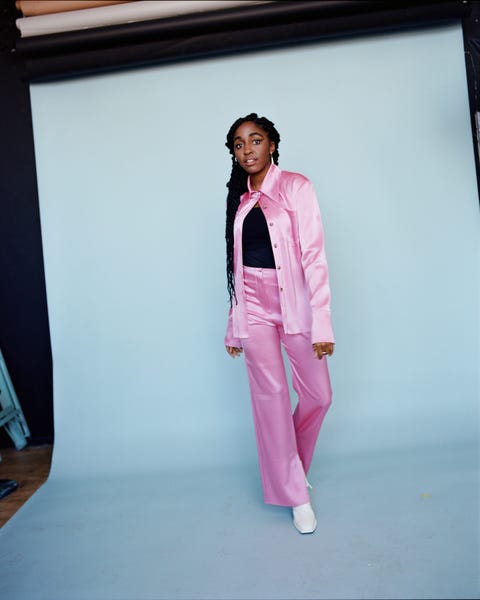Ayo Edebiri suspects that I have her confused with someone else. Her PR team “sent me examples of your stories with Kathryn Hahn and Jonathan Majors,” she says, stressing their surnames as if they are an entirely different caliber of celebrity. “I mean, if you want to talk to me, no worries. I don’t mind talking to people! But, like… please justify why?”
Here’s why: Few young comedians have Edebiri’s versatility. She’s a wunderkind who hasn’t realized it yet. It’s true that, at age 25, Edebiri’s not a household name in the vein of Michael Che, Chelsea Peretti, or John Mulaney. (For one, she’s not having burgers with Olivia Munn.) But she is a deft master of an extremely particular brand of ironic, almost absurdist humor that plays well on Twitter, and her drawn-out gags have landed her in the corrections section of BuzzFeed, an accolade in and of itself. She’s taken a refreshingly creative approach to comedy, depending less on flashy stand-up specials and more on podcasts and television, appearing as Hattie in Apple TV+’s Dickinson while growing into the new voice of Big Mouth’s Missy, following Jenny Slate’s departure in 2020. She’s just as talented a writer as she is an actress: A co-producer on the upcoming Tina Fey-led Netflix animated series Mulligan, she’s also set to star in an FX pilot led by Shameless’s Jeremy Allen White, called The Bear. This week, you can find her in Zoe Lister-Jones’s pre-apocalyptic dramedy How It Ends. It’s hardly a stretch to call her a burgeoning star. And yes, whether or not she believes it, she can exist in the same conversation as someone like Hahn.
But perhaps what’s most intriguing about Edebiri right now, in this moment, is that she’s not yet a true celebrity—she can giggle at her own relative obscurity and spin it into material. One of her most infamous bits resides in her Twitter bio: She claims to be “Showrunner of The Kominksy [sic] Method—now streaming on Netflix, Vudu, and the ITV app.”
In case it wasn’t already obvious, Edebiri does not, in fact, run the Michael Douglas comedy, in which two aging white men deal with the travails of, well, aging. She simply thought the idea of her, a young Black female comedian, helming a show about two old white dudes was too good to pass up. It’s “like a little joke for me,” she explains. Yet it quickly became a joke on her audience, and she can’t help but relish in those who stumble into her realm.
“I got in trouble for that the other day on the set of The Bear,” she says, grinning. “I was in a car with these other actors who were on the show and are a little bit older—I don’t think they’re on Twitter. One of them was like, ‘I didn’t even realize you were the showrunner at The Kominsky Method! I love that show, that’s so impressive, I’m so proud of you!’ And I was like, ‘I don’t know how to say… Like, has this joke gone too far?’”
But of course it hasn’t—because the whole point of a running joke is to see just how far it can go. Edebiri thoroughly enjoys testing these boundaries, riffing on the millennial tendency for hyperbole (“no pronouns // do not refer to me ever,” reads one of her most popular tweets).
Edebiri’s also enviously good at taking the nonlinear path, riding it like a rollercoaster rather than forcing a track change. Even during her time as an undergraduate at New York University, she was aware of how “so many things about this industry can feel so amorphous,” so she simply started throwing darts at the wall: writing, doing stand-up, going to open mics, acting, and voice acting. She developed a love of animation after renting her first VHS of Sailor Moon at Blockbuster (RIP). The animated world is now one of her primary art forms, capable of transforming her hyperboles into new (and even funnier) territory. “It’s fun to have an idea that physically does not make sense, but there are a group of talented people who understand the insane things you say and can make it make sense and make it look beautiful and make it look cool,” she says.
Even her own career has been something of an exercise in longevity. Raised in Boston by two immigrant parents—her mother from Barbados, her father, Nigeria—she grew up watching a very specific genre of Christian stand-up. I ask what attracted her to a career making people laugh, and she deflects: “If I knew the true answer, I probably wouldn’t be doing comedy. I’d be living on a farm raising chickens and doing pottery. If I truly knew the answer, I would not have social media; I would read eight books a day.”
Part of what allowed Edebiri to continue down this path was a realization that the comedy world was changing. She could see the shift in her inspirations (and, in several cases, real-life friends): Naomi Ekperigin, Maria Bamford, Jacqueline Novak, Petey DeAbreu, Patti Harrison, and Mitra Jouhari, to name several. The industry didn’t feel as misogynistic nor as cutthroat as it once had. “[Comedy] was a lot less isolating and ego-based than I thought it was,” she says. “There’s a lot more collaboration and community.”
And social media meant she could reach anyone, instantly, with a well-timed post. I ask what the difference is between a joke tweet and a joke she saves for stand-up or TV. How does she know the best place to slot good material?
“I don’t know if there’s an actual thought process,” she admits. “My brain is, like, ‘This is just a thought that I want to fire off,’ and I know that it’s meant to be read and processed for 30 seconds.”
“Are you ever like, ‘This is going to kill on Twitter?’” I ask.
“Anytime I do think, ‘This is a banger,’ I get 50 likes. I have to move; I need to change my name.”
I don’t tell her that 50 likes is good for some of us. It’s clear that Edebiri is still too self-effacing—or perhaps too self-deprecating—to recognize she’s winning.
In the writers’ room for season 2 of Dickinson, Edebiri made such an impression that she was brought out from behind the camera and cast as Hattie, one of the Dickinson family servants whom Emily Dickinson asks to join a seance. With perfect deadpan delivery—and her signature touch, a note of absurdity—Edebiri replies, “I don’t need to talk to any more dead white people.”
What she does need is more opportunities and more space to play. She possesses a wild imagination, and an eagerness to chase it to extremes. Take her pitch for the upcoming Frasier reboot, for instance. She recently tweeted that she wanted to cancel the titular character. I ask if she’d care to elaborate.
“Paramount, if you want to reach out, I’m at CAA,” Edebiri says as an aside, before launching in: Dr. Frasier Crane (Kelsey Grammer) has left Seattle, but upon the death of his father, he returns to a changing, rapidly gentrifying city. Realizing “there’s no more radio, basically,” he’s forced to take a meeting with Edebiri, a successful podcast host. He wants her to teach him how to podcast so he can recapture his hit radio audience, but he hasn’t learned the internet’s lingo and “says a bunch of things that are really insulting to millennials.”
Edebiri adds, “And obviously, I cancel him.”
Sure, Frasier’s cancellation is probably overdue. But then what?
“Well, when we’re done feuding, I help him make a podcast. I’m his new producer.”
In other words, in the end, Edebiri’s the one laughing. She follows the joke until she’s the one on top.
To be fair, she’s keenly aware that her peak is a long ways off. A few days ago, she recalls telling a local driver that she was an actress; he asked what she’d been in.
“Well, some things,” she said. “But I don’t think you’ve seen them. Because you told me the only things you watch are Marvel shows.”
“Well, what have you been in? Don’t be so doubtful.”
“I’m not being doubtful. I’m just working with the information I’ve been given.”
Try me, he dared. So she told him: Dickinson, How It Ends, Big Mouth.
“I don’t watch any of that.”
“Yeah, I know.”
Alas, Edebiri gets a kick out of her own embarrassment. Perhaps she’s her own best gag, an up-and-comer with an as-yet-uncertain endpoint. Stardom isn’t exactly synonymous with happiness, anyway. “I don’t think I have any desire to, I don’t know, be riding a horse for Givenchy perfume,” she says. “I’d actually be falling off the horse, being dragged, riding sideways.”
But, hey, if it got a good laugh? Giddy up.
This content is created and maintained by a third party, and imported onto this page to help users provide their email addresses. You may be able to find more information about this and similar content at piano.io



